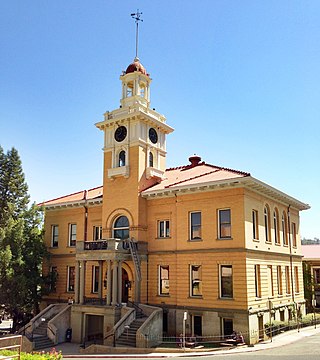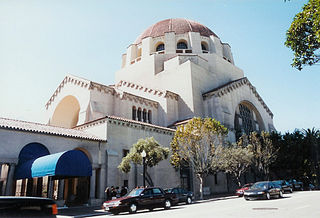
Sonora is the county seat of Tuolumne County, California, United States. Founded during the California Gold Rush by Mexican miners from Sonora, the city population was 5,121 during the 2020 Census, an increase from the 4,903 counted during the 2010 Census.

The Gold Country is a historic region in the northern portion of the U.S. state of California, that is primarily on the western slope of the Sierra Nevada. It is famed for the mineral deposits and gold mines that attracted waves of immigrants, known as the 49ers, during the 1849 California Gold Rush.

State Route 49 is a north–south state highway in the U.S. state of California that passes through many historic mining communities of the 1849 California gold rush and it is known as the Golden Chain Highway. The highway's creation was lobbied by the Mother Lode Highway Association, a group of locals and historians seeking a single highway to connect many relevant locations along the Gold Rush to honor the 49ers. One of the bridges along SR 49 is named for the leader of the association, Archie Stevenot.

The Magnes Collection of Jewish Art and Life, formerly known as the Judah L. Magnes Museum from 1961 until its reopening in 2012, is a museum of Jewish history, art, and culture in Berkeley, California. The museum, which was founded in 1961 by Seymour and Rebecca Fromer, is named for Jewish activist Rabbi Judah L. Magnes, a native of Oakland and co-founder of the Hebrew University of Jerusalem. The Magnes Collection of Jewish Art and Life houses more than 30,000 Jewish artifacts and manuscripts, which is the third largest collection of its kind in the United States.
The Sacramento Valley Railroad (SVRR) was incorporated on August 4, 1852, the first transit railroad company incorporated in California. Construction did not begin until February 1855 because of financial and right of way issues, and its first train operated on February 22, 1856. Although the oldest working railroad in the state was the Arcata and Mad River Railroad, first operational in December 15, 1854, the Sacramento Valley Railroad was the West's pioneering incorporated railroad, forerunner to the Central Pacific.

Congregation Emanu-El of San Francisco, California is one of the two oldest Jewish congregations in California, and one of the largest Jewish congregations in the United States. A member of the Union for Reform Judaism, Congregation Emanu-El is a significant gathering place for the Bay Area Jewish community.
The Golden Empire Council (GEC-BSA) is a California-based 501(c)(3) nonprofit affiliated with the Boy Scouts of America and its Western Region, Area 4. The council serves a large section of Northern California, primarily the Sacramento Valley and the northern Sierra Nevada. Its boundaries range north to south from Redding to Elk Grove and west to east from Vacaville to Pollock Pines and include 16 Northern California Counties. Its council headquarters and service center is located in Sacramento. The council also operates two Scout Shops selling BSA merchandise; located in Sacramento and Chico.
In the United States, Canada, Australia, and elsewhere, a pioneer cemetery is a cemetery that is the burial place for pioneers. American pioneers founded such cemeteries during territorial expansion of the United States, with founding dates spanning, at least, from the late 18th to early 20th centuries.
Middle Bar is a former mining town on the Mokelumne River in Amador County, California. It is a California Historical Landmark.
Marysville Hebrew Cemetery also known as Marysville Jewish Cemetery, and Jewish Cemetery of Marysville, is a no longer active Jewish cemetery founded in 1855 by the Marysville Hebrew Benevolent Society, and is located at the southeast corner of Marysville Cemetery, in Marysville, California. In 1945, the cemetery was abandoned and forgotten; by 1995 it was restored.
Placerville Union Cemetery, formerly Union Cemetery, is a burial ground formed in 1871 by a group of fraternal organizations, and located in Placerville, California. It had been established as a private cemetery, and in 2005 the management was switched to the El Dorado County.
Nevada City Jewish Cemetery is a no longer active Jewish cemetery founded in 1854 by the Nevada Hebrew Society, and located in Nevada City, Nevada County, California. The last burial was during the summer of 1890. There are only 29 headstones that are visible. On October 29, 1972, the site was dedicated as a historical site.
Jackson Pioneer Jewish Cemetery, also known as Givoth Olam, is a no longer active Jewish cemetery founded in 1857 by the Congregation B'nai Israel, and is located in Jackson, Amador County, California. By 1921, the cemetery was closed.
Chevra Kaddisha Cemetery, later known as Home of Peace Cemetery, was the first Jewish cemetery in California founded on November 12, 1850, by the Sacramento City Hebrew Association, and was once located at 33rd at K Streets in the East Sacramento neighborhood of Sacramento, California. The cemetery closed around 1924, and is no longer standing. It is the location of a strip mall, there is no historical plaque.
The Pioneer Jewish Synagogue was a former Jewish synagogue located in Jackson in Amador County, California, in the United States. Built in 1857, the congregation vacated the building in 1869, and the former synagogue building was demolished in 1948.
Grass Valley Pioneer Jewish Cemetery, also known as Shaar Zedek is a no longer active Jewish cemetery founded in 1856 by the Hebrew Benevolent of Society of Grass Valley, and is located in Grass Valley, California, U.S. The last burial happened in 1891. It is a private site operated by the Commission for the Preservation of Pioneer Jewish Cemeteries and Landmarks in the West and is not open to the public.
Pioneer Jewish Cemetery may refer to:
Placerville Pioneer Jewish Cemetery is a no longer active Jewish cemetery founded in 1854 by the Placerville Hebrew Benevolent Society, and is located in Placerville, California. The last burial happened in 1968. It is a private site operated by the Commission for the Preservation of Pioneer Jewish Cemeteries and Landmarks in the West and is not open to the public.
Pioneer Baby's Grave is a historical site in Redding, California in Shasta County. Pioneer Baby's Grave is a California Historical Landmark No. 377 listed on July 28, 1942. George and Helena Cohn Brownstein lived in Red Bluff. There infant son, 8-month-old, Charles Brownstein died on December 14, 1864. As there was Jewish cemetery in Red Bluff, George and Helena traveled 40 miles in two-days by covered wagon to a Jewish cemetery founded in 1857 by the Shasta Hebrew Congregation, Shasta Hebrew Benevolent Society. Charles was interred in Shasta Hebrew Congregation's Jewish cemetery, the first one found in the region. When California State Route 299 was built in 1923, the plans route the highway as to not disturb the grave. The Jewish cemetery was neglected for some years, till in 1976 when the Redding Jewish Community Center was founded. The site is now cared for by the Jewish Community Center.






